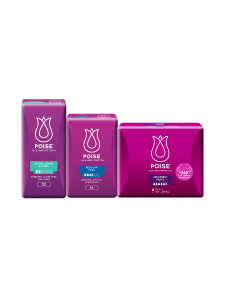WHAT IS LIGHT BLADDER LEAKAGE?
Light Bladder Leakage is best described as involuntary bladder loss and it is something experienced by thousands of women every day. In fact, it is so common that you can expect a third of your friends to be having similar experiences.
Although it can be a subject difficult to discuss with others, the good news is light bladder leakage is entirely manageable. There are all sorts of treatments, tips and tricks to get on top of your light bladder leakage so that you can get on with enjoying your life. During your journey, POISE® range delivers discreet, reliable leakage protection.
Don't be discouraged if you get setbacks when trying to regain your bladder control. This can be due to being tired or run down due to illness, such as colds or flu, or a urinary tract infection (see your doctor immediately if you suspect you have an infection).
WHAT CAUSES LIGHT BLADDER LEAKAGE?
Light Bladder Leakage can happen to all kinds of women, and for all kinds of reasons. While it can occur at any stage of life, it’s common during pregnancy and after childbirth, as pressure on the bladder weakens the pelvic floor muscles. While there are several types, the most common type of incontinence that affects women is stress incontinence. Other common types of female incontinence are urge and overflow incontinence.
If you're experiencing menopause, light bladder leakage can occur due to your Oestrogen levels dropping, affecting the elasticity of your pelvic floor muscles and the tissues supporting your bladder and the lining of your urethra. Prolapse is another condition that can bring about light bladder leakage.
Other causes of light bladder leakage can relate to any surgery you may have had on your pelvic floor. It can also occur as a result of medical issues within your body such as infections in the bladder or kidneys, a thyroid disorder or a neurological condition such as Parkinson's disease.
WHAT TRIGGERS LIGHT BLADDER LEAKAGE?
Understanding and identifying what triggers are causing your light bladder leakage will help you manage and possibly improve your bladder problems. Sometimes a cure is as simple as avoiding certain stressful situations or through modifying your diet.
Light bladder leakage triggers can include:
- Coughing, sneezing, laughing, vigorous exercise or activity and even picking up something heavy, like a small child when your bladder is full
- Excessive fluid intake
- Drinking coffee or tea
- Smoking
- Diabetes
- Pelvic floor surgery
- Medical conditions such as a Thyroid disorder or a neurological condition like Parkinson's disease
- Displacement of pelvic organs
- Prolapse
- Menopause
If your light bladder leakage persists, you may want to talk to your doctor or local continence advisor about the very effective treatments and coping strategies that are readily available.







